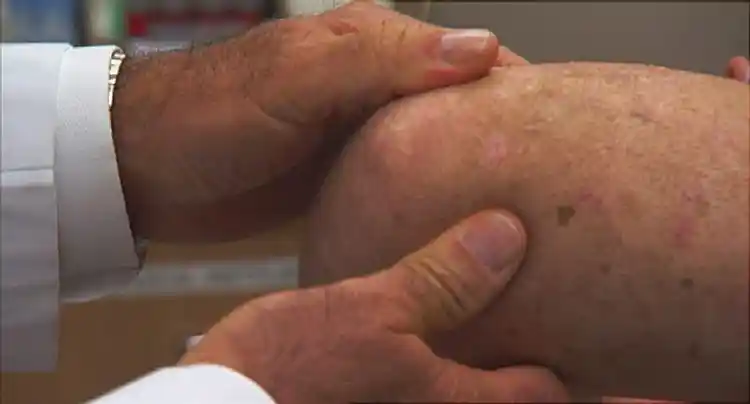Biologics for Psoriasis

Hide Video Transcript
Video Transcript
JERRY BAGEL, MD
So you don't have any nail pitting. That's good. CLAYTON LEACH
But here I am, a seventh grader with this monstrous plaque right in the middle of my forehead. So my first encounter with this disease was not just a little rough skin or a little here and there, but something that everybody-- it was just presented so for everybody to see. JERRY BAGEL, MD
Psoriasis is an immunologic disease of the skin. This has major impact on social development and self-esteem resulting in a higher risk of depression. How do you deal with it? It's simple. Clear them up. People that are candidates for phototherapy in fact are also candidates for biologic agents. It's a matter of preference. However, having said that, biologic agents do decrease the immune system some and increase your risks of infections. CLAYTON LEACH
I've been involved with biologics since 19-- well let's just say 1998, and for me, it changed my life. JERRY BAGEL, MD
You may have a few patches left. There's going to be some people that are totally clear, and unfortunately there's going to be a percentage that it doesn't work well enough to continue. But the vast majority of people have an excellent response to these drugs. CLAYTON LEACH
It's a total non-event. JERRY BAGEL, MD
It's like the patient doesn't even see the needle. They touch it. It goes in very quick, and when they first started, they were burning. The solutions they were in might have been too basic or acidic. They've modified it, so most patients are compliant with injections. Let's go back 10 years before the FDA approved any biologic agents. The best treatment for psoriasis at that time was known as Goeckerman therapy. We had it in this office. People would come here for six hours a day, five days a week for four weeks to go into a tar bath, tar ointment, moisturizer cream, scalp debridement, moisturizers, increasing increments of ultraviolet B light, and Anthralin. They'd stay here for six hours a day, five days a week for four weeks. You want to talk about intimidation. It's going to take between 12 and 24 weeks before we see maximum effectiveness from this drug, so you're going to have to have a little patience. Some drugs kick in quicker than others. Some patients respond quicker than others, and in some patients, the drugs work for a few years and then lose efficacy. CLAYTON LEACH
I'm looking at this stuff that I had been battling my entire life, and it's going away. It's just going away. JERRY BAGEL, MD
Remember, and this is what I tell most of my patients, when they ask me how long are they going to have to be on a biologic agent, I say you have a chronic immunologic disease of the skin. This is not poison ivy. This is not a three week disease. If I told you had diabetes and you had to go on insulin, you wouldn't ask me how long. You would say, how much, and how do I check it? Well, psoriasis is a chronic disease as well. It waxes and wanes. It gets better, and it gets worse. But most of the time, it's going to come back, so you're going to need to be under some sort of chronic therapy. 